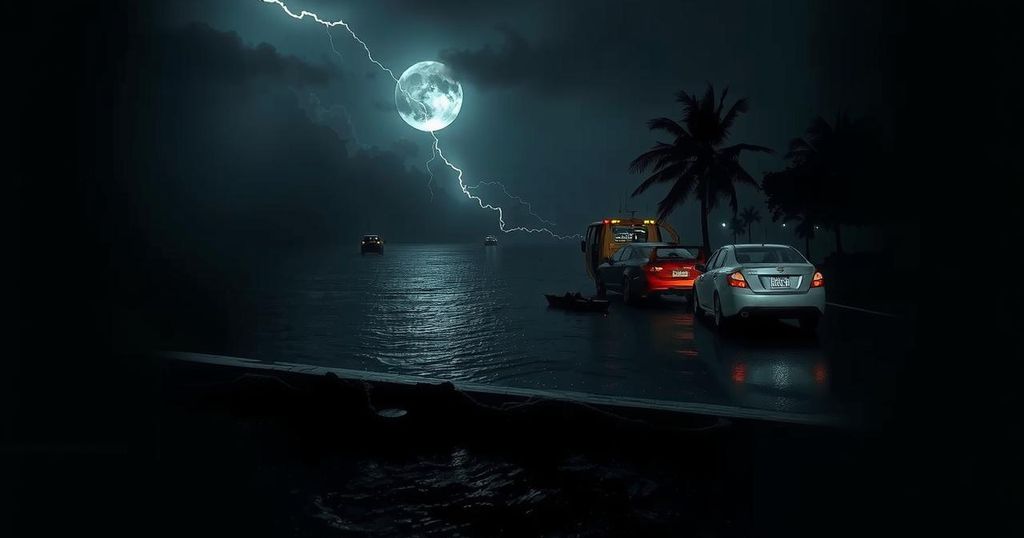Global news
ASIA, CUBA, EUROPE, GERMANY, GULF OF MEXICO, HURRICANE, HURRICANE BERYL, ISRAEL, JOSE MARTI INTERNATIONAL AIRPORT, MIGUEL DIAZ - CANEL, NATIONAL HURRICANE, NATURAL DISASTER, NATURAL DISASTERS, NHC, NORTH AMERICA, PINAR DEL RIO, POWER OUTAGES, RAFAEL, TRUMP, UNITED, UNITED STATES NATIONAL HURRICANE CENTER, YD, YDAEL PEREZ BRITO
Fatima Khan
0 Comments
Cuba Faces Nationwide Power Outage Following Hurricane Rafael
Following Hurricane Rafael, the entire island of Cuba has been left without power for the second time in two weeks. The storm exerted devastating effects on agriculture and infrastructure, further exposing the vulnerabilities in Cuba’s disaster response systems. Many citizens are expressing despair over their losses and the ongoing impact of these natural disasters, while authorities work to mobilize resources for recovery amidst challenging economic conditions.
Cuba has experienced a complete power outage across the island for the second time within two weeks, following the devastating impact of Hurricane Rafael. This Category 3 hurricane struck Cuba’s western agricultural regions, inflicting widespread damage on crops and infrastructure. Reports indicate that Rafael’s winds reached a maximum speed of 185 km/h (115 mph), prompting dire warnings about life-threatening storm surges and flash flooding in a country already challenged by economic difficulties and aging infrastructure. Residents of Havana, emerging from their homes to evaluate the aftermath of the storm, discovered dry streets but were met with the ongoing challenges of closed businesses, halted transport services, and a lack of power. Authorities grounded flights at major airports, including Havana’s Jose Marti International Airport, as the military was mobilized to assist with recovery efforts. Agriculture Minister Ydael Perez Brito revealed that farmers had made efforts to safeguard 8,000 tonnes of tobacco leaves, along with ripening produce, from the storm’s wrath. The emotional toll on the population was palpable, as many expressed despair over their challenging circumstances. Marta Leon Castro, a local resident, lamented, “I am desperate, I am homeless. The roof is gone, and I don’t know what I’m going to do.” As in a previous outage caused by deteriorating infrastructure and Hurricane Oscar, affected residents are concerned about the potential spoilage of their food supplies and the ongoing struggles for basic services. The current hurricane season has seen 17 named storms, with Rafael being one of eight that reached major hurricane status. The United States National Oceanic and Atmospheric Administration forecasts indicate an above-average hurricane season for 2024, heightening the need for effective disaster preparedness and response strategies in vulnerable regions like Cuba. Given the historical context of such natural disasters in Cuba, and the government’s limited resources amid economic hardships, there prevails a sense of anxiety among the populace regarding the ability of authorities to restore essential services promptly. As authorities continue to manage the aftermath of Hurricane Rafael, there is an urgent need for comprehensive recovery efforts and enhancements to the island’s infrastructure to mitigate the impacts of future storms. Failure to address these issues could lead to further cycles of disaster and recovery, leaving the Cuban population in a perpetual state of vulnerability.
Cuba is highly susceptible to hurricanes due to its geographical location, experiencing severe weather patterns that challenge its infrastructure and services. The country’s economic dependencies and strained relations with the United States complicate recovery efforts after disasters, leading to concerns among citizens about the capacity of the government to effectively respond to crises. Recent hurricanes, including Rafael and Oscar, have intensified the critique of the aging electrical infrastructure and the need for immediate support services for those affected by such natural disasters.
In summary, the complete power outage in Cuba following Hurricane Rafael underscores the island’s vulnerability to severe weather and the urgent need for effective disaster management. The emotional distress expressed by residents highlights the impact of repeated natural disasters on their lives and the pressing challenges posed by inadequate infrastructure. As Cuba anticipates future storms, enhancing disaster preparedness and recovery efforts is essential to addressing the limitations of the current system and ensuring the safety and wellbeing of its citizens.
Original Source: www.aljazeera.com




Post Comment